Our surprising magnetic galaxy
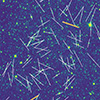 A team of astronomers created the first-ever map of magnetic field structures within a spiral arm of our Milky Way galaxy.
A team of astronomers created the first-ever map of magnetic field structures within a spiral arm of our Milky Way galaxy.
Jan 11th, 2024
Read more
 Subscribe to our Space Exploration News feed
Subscribe to our Space Exploration News feed
 A team of astronomers created the first-ever map of magnetic field structures within a spiral arm of our Milky Way galaxy.
A team of astronomers created the first-ever map of magnetic field structures within a spiral arm of our Milky Way galaxy.
Jan 11th, 2024
Read more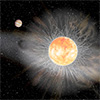 A new study finds that cosmic hotspots for finding alien neighbors might be around stars hitting their midlife crisis and beyond.
A new study finds that cosmic hotspots for finding alien neighbors might be around stars hitting their midlife crisis and beyond.
Jan 11th, 2024
Read more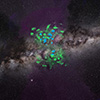 Astronomers have discovered over 250 gaseous clouds being blasted out of the center of the Milky Way into interstellar space.
Astronomers have discovered over 250 gaseous clouds being blasted out of the center of the Milky Way into interstellar space.
Jan 11th, 2024
Read more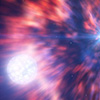 Scientists have found a direct link between the explosive deaths of massive stars and the formation of the most compact and enigmatic objects in the Universe: black holes and neutron stars.
Scientists have found a direct link between the explosive deaths of massive stars and the formation of the most compact and enigmatic objects in the Universe: black holes and neutron stars.
Jan 10th, 2024
Read more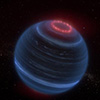 Astronomers have found a brown dwarf with infrared emission from methane, likely due to energy in its upper atmosphere. This is an unexpected discovery because the brown dwarf, W1935, is cold and lacks a host star.
Astronomers have found a brown dwarf with infrared emission from methane, likely due to energy in its upper atmosphere. This is an unexpected discovery because the brown dwarf, W1935, is cold and lacks a host star.
Jan 10th, 2024
Read more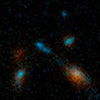 Astronomers find fast radio burst originated not in one galaxy but a group of galaxies on the path to a possible merger.
Astronomers find fast radio burst originated not in one galaxy but a group of galaxies on the path to a possible merger.
Jan 9th, 2024
Read more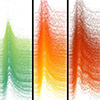 In the culmination of a decade's worth of effort, the DES collaboration of scientists analyzed an unprecedented sample of more than 1,500 supernovae classified using machine learning.
In the culmination of a decade's worth of effort, the DES collaboration of scientists analyzed an unprecedented sample of more than 1,500 supernovae classified using machine learning.
Jan 9th, 2024
Read more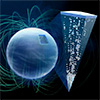 A new experiment has shown that the formation of diamonds from carbon compounds occurs at lower pressures and temperatures than previously assumed.
A new experiment has shown that the formation of diamonds from carbon compounds occurs at lower pressures and temperatures than previously assumed.
Jan 8th, 2024
Read more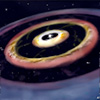 A three-ringed structure in the planet-forming zone of a circumstellar disk where metals and minerals serve as a reservoir of planetary building blocks.
A three-ringed structure in the planet-forming zone of a circumstellar disk where metals and minerals serve as a reservoir of planetary building blocks.
Jan 8th, 2024
Read more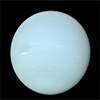 Neptune is fondly known for being a rich blue and Uranus green - but a new study has revealed that the two ice giants are actually far closer in colour than typically thought.
Neptune is fondly known for being a rich blue and Uranus green - but a new study has revealed that the two ice giants are actually far closer in colour than typically thought.
Jan 6th, 2024
Read more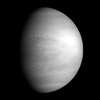 Researchers may have identified the missing component in the chemistry of the Venusian clouds that would explain their colour and splotchiness in the UV range, solving a long-standing mystery.
Researchers may have identified the missing component in the chemistry of the Venusian clouds that would explain their colour and splotchiness in the UV range, solving a long-standing mystery.
Jan 5th, 2024
Read more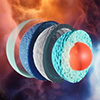 New theoretical analysis places the likelihood of massive neutron stars hiding cores of deconfined quark matter between 80 and 90 percent. The result was reached through massive supercomputer runs utilizing Bayesian statistical inference.
New theoretical analysis places the likelihood of massive neutron stars hiding cores of deconfined quark matter between 80 and 90 percent. The result was reached through massive supercomputer runs utilizing Bayesian statistical inference.
Dec 28th, 2023
Read more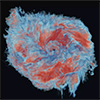 International research team models the different signatures of a kilonova explosion simultaneously for the first time.
International research team models the different signatures of a kilonova explosion simultaneously for the first time.
Dec 22nd, 2023
Read more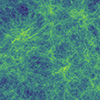 Researchers have analyzed more than one million galaxies to explore primordial fluctuations that seeded the formation of the structure of the entire universe.
Researchers have analyzed more than one million galaxies to explore primordial fluctuations that seeded the formation of the structure of the entire universe.
Dec 22nd, 2023
Read more A pancake stack of radioactivity-sensitive films carried through the sky by a balloon was able to take the world's most accurate picture of a neutron star's gamma ray beam.
A pancake stack of radioactivity-sensitive films carried through the sky by a balloon was able to take the world's most accurate picture of a neutron star's gamma ray beam.
Dec 22nd, 2023
Read more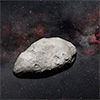 Analysis of organic compounds - called polycyclic aromatic hydrocarbons (PAHs) - extracted from the Ryugu asteroid and Murchison meteorite has found that certain PAHs likely formed in the cold areas of space between stars rather than in hot regions near stars as was previously thought.
Analysis of organic compounds - called polycyclic aromatic hydrocarbons (PAHs) - extracted from the Ryugu asteroid and Murchison meteorite has found that certain PAHs likely formed in the cold areas of space between stars rather than in hot regions near stars as was previously thought.
Dec 22nd, 2023
Read more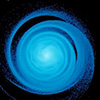 A new snapshot of an ancient, far-off galaxy could help scientists understand how it formed and the origins of our own Milky Way.
A new snapshot of an ancient, far-off galaxy could help scientists understand how it formed and the origins of our own Milky Way.
Dec 22nd, 2023
Read more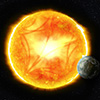 A team of astronomers has used asteroseismology, or the study of stellar oscillations, to accurately measure the distance of stars from the Earth. Their research examined thousands of stars and checked the measurements taken during the Gaia mission to study the near Universe.
A team of astronomers has used asteroseismology, or the study of stellar oscillations, to accurately measure the distance of stars from the Earth. Their research examined thousands of stars and checked the measurements taken during the Gaia mission to study the near Universe.
Dec 15th, 2023
Read more